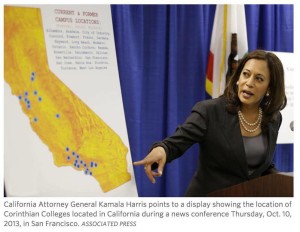California’s first open Senate seat in twenty-four years has failed to garner the caliber of candidates one would expect in the U.S.’s most populous state. In the five months since Democratic Sen. Barbara Boxer announced her retirement, few major contenders have entered the race. The expense of running a serious Senatorial campaign is likely driving away the majority of potential candidates. Media and political operatives have speculated for months that one candidate has scared away the competition.
Since Sen. Boxer declared she will not run for a fifth term, the first candidate to announce for her seat in Congress was California’s first female Attorney General, Kamala Harris. Within days of her announcement, Harris had collected a long list of endorsements from prominent Democrats across the country. Lieutenant Governor, and former San Francisco Mayor, Gavin Newsom had been thought to be Harris’ toughest opponent, but he has announced he will run for governor in 2016 instead. Harris, is generally viewed as unbeatable by supporters, but unknown by half of the state’s registered voters. Challengers have a chance to triumph against one of California’s rising star politicians.
Born in Oakland, California, she could become California’s first Indian American and African American Senator. There has only been one Asian American Senator in California, SI Hiyakawa from 1977 – 1983.
After completing her undergraduate studies at Howard University, Harris returned to California to further her studies at the University of California, Hastings College of Law where she received her Juris Doctor.
Harris has made her career in public service starting in the Alameda County District Attorney’s office before moving to the San Francisco office where she was elected District Attorney for the city and county of San Francisco in 2003. During her tenure as District Attorney, she cracked down on human trafficking and forced prostitution, an issue that disproportionately affects Asian women in the San Francisco Bay Area. Dozens of fronts for prostitution were shuttered in a matter of three years, and her vow to end the exploitation of immigrant women continued after her election as the state’s top attorney.
She has advocated harsher penalties for human traffickers which has resulted in the writing of new laws since her election to the Attorney General’s office in 2010. The continued assault on criminal enterprises moving trafficked women across the state has led to the freeing of victims, hundreds of them Chinese immigrants, and increased prosecution of anyone culpable in the activities contributing to forced labor and prostitution of women and children.
Among her other endeavors as Attorney General, Harris settled an unprecedented case involving the United States’ biggest banks’ predatory lending practices, promising $20 billion for struggling families. When Proposition 8 opponents headed to court, she refused to defend the law passed by voters in 2008. Her decision effectively led to marriage equality in California–once courts ruled that private parties had no legal standing to defend the law. Since her election, Harris has launched an attack on illegal gun ownership, and the lack of consumer privacy on the internet. Many of the issues she has made pillars of her tenure in Sacramento have led to a larger national profile, preparing her for a position in the federal government. Speculation was rife that Harris was a potential Supreme Court Justice before President Obama nominated now-Justices Sonia Sotomayor and Elena Kagan.
Despite her relatively unknown status among voters in California, Harris has been frequently named one of the most powerful women in the United States by Oprah and major media publications, and made Time Magazine’s 100 Most Influential People in the World list in 2013.




